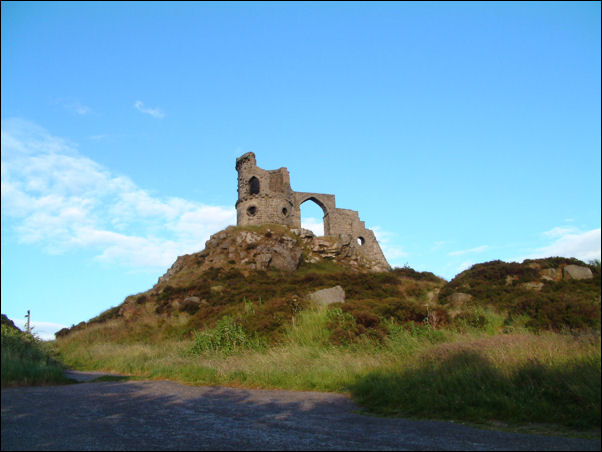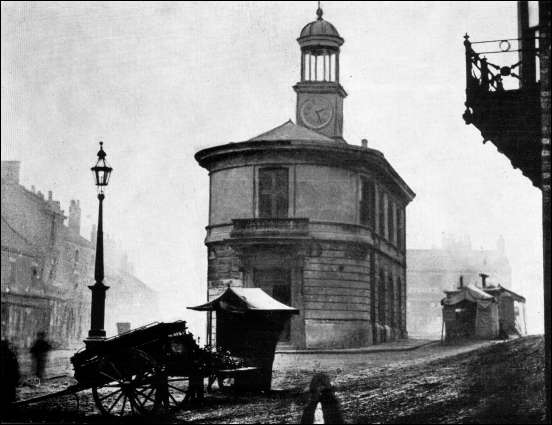|
Turnhill - Bennett's Tunstall
| Tunstall is the most
northerly of the potteries towns. Described as being the shape of
tiny beetle by Arnold Bennett, it lays claim to being the metropolis
for the Moorland villages to the north of the potteries, which
include Kidsgrove to the North and Biddulph Moor to the north east. |
In the opening sequence of
his classic novel, The Old Wives Tale, Arnold Bennett refers to Mow
Cop, a hilltop settlement to the north of Tunstall, as a place where
religious orgies occurred. The settlement, a rugged wind exposed peak, in
fact became the birth place of primitive Methodism, which in the 1700's
fought for the hearts and souls of the local population over the more
established Wesleyan worship.

Mow Cop -to the north of
Tunstall
"It was
the winter of 1835, January. They passed through the marketplace of the
town of Turnhill, where they lived. Turnhill lies a couple of miles north
of Bursley.
One side of the market-place was barricaded with stacks of coal, and the
other with loaves of a species of rye and straw bread. This coal and these
loaves were being served out by meticulous and haughty officials, all
invisibly braided with red-tape, to a crowd of shivering, moaning, and
weeping wretches, men, women and children - the basis of the population of
Turnhill."

Tunstall town hall in
Market Square c.1885

Sleepy
Turnhill
Tunstall, or the Turnhill of
Bennett's novels, is of little importance as a location in his Five Town
Novels. Indeed, the people of the beetle shaped Turnhill would have been
considered 'foreigners' by Constance and Sophia Bains in the provincial
square of Bursley.
Little is said about
Tunstall in Bennett's novels, but a number of Characters from the sleepy
ancient village of Turnhill are introduced into the metropolis of Bursley
life. Miss Chetwynd is a school teacher from Turnhill to whom Sophia Bains
turns to try and escape life in the Bursley Drapery.
In "Anna of The Five Towns"
unnamed people from Turnhill buy the business of Willie Price allowing him
money enough to emigrate to Australia. In "Helen of the High Hand",
Helen's Uncle collects property rents in the small town of Tunstall;
"I bank
I' Bosley, and I bank I' Turnhill, too. And I bank once I' Bosley and
twice I' Turnhill o' Mondays, and twice I' Bosley o' Tuesdays. Only
yesterday I was behind. I reckon as I can do all my collecting between
nine o' clock Monday and noon Tuesday. I go th' worst tennents first -
be sure o' that.
There's
some o' 'em, if you don't catch 'em early o' Monday, you don't catch 'em
at all. " It's incredible to me how you can do it all in a day and a
half," she pursued. "why, how many houses are there?" "Near two hundred
and forthy I' Bosley," he responded. "Hast forgotten th' sugar this
time, lass?" "And in Turnhill?" she said passing the sugar. "I think
I'll have that piece of bacon if you don't want it." "Over a hundred,"
said he. "A hundred and twenty".

"Bastille" the Workhouse
Perhaps, the most moving
reference to small Tunstall in the Bennett novels is to be found in the
Classic, "Clayhanger". It's the Turnhill school-teacher Mr. Shushions who
saves the Clayhanger family from the feared poor house of the area;
"The
Bastille was on the top of a hill about a couple of miles long, and the
journey thither was much lengthened by the desire of the family to avoid
the main road.
They were all intensely ashamed; Darius was ashamed to tears, and did
not know why; even his little sister wept and had to be carried, not
because she was shoeless and had nothing to eat, but because she was
going to the Ba-ba-bastille; she had no notion what the place was. It
proved to be the largest building that Darius had ever seen; and indeed
it was the largest in the district; they stood against its steep sides
like flies against a kennel.
Then there was rattling of key-bunches, and the rasping voices of sour
officials, who did not inquire if they would like a meal after their
stroll. And they were put into a cellar and stripped and washed and
dressed in other people's clothes, and the separated, amid tears. And
Darius was pitched into a large crowd of other boys, all clothed like
himself. He now understood the reason for shame; it was because he could
have no distinctive clothes of his own, because he had somehow lost his
identity. All the boys had a sullen, furtive glance, and when they spoke
it was in whispers."

the face of Arnold
Bennett watches over a family wending their way to the workhouse
(from a mural in the Potteries Shopping Centre)
The poor house that
Bennett based his emotive writings on, was in fact the poor house of
Chell. Chell is a suburb of Tunstall on the easterly road to the ancient
settlement of Moorland Biddulph. It was to this place that the truly poor
of the district would be incarcerated in the mid 1800's.
The Union Workhouse or the
Bastille in Bennett's novel "Clayhanger" would strike fear into the
hearts of the people of the area. The residents of Tunstall would hurry
past its door, not daring to look up or breath the air around the building
for fear that they would catch the extreme poverty which seemed to afflict
some families, like the nameless horror of an unspeakable disease. The
horrors that awaited the poor residents of the Bastille so
graphically captured by Bennett.
"In the
low room where the boys were assembled there fell a silence, and Darius
heard someone whisper that the celebrated boy who had run away and been
caught would be flogged before supper. Down the long room ran a long
table. Some one brought in three candles in tin candlesticks and set
them near the end of this table. Then somebody else brought in a picked
birch-rod, dripping with salt water from which it had been taken, and
also a small square table. Then came some officers, and a clergyman, and
then, surpassing the rest in majesty, the governor of the Bastille, a
terrible man. The governor made a speech about the crime of running away
from the Bastille, and when he had spoken for a fair time, the clergyman
talked in the same sense; and then a captured tiger, dressed like a boy,
with darting fierce eyes, was dragged in by two men, and laid face down
on the square table, and four boys were commanded to step forward and
hold tightly the four members of this tiger. And, his clothes having
previously been removed as far as his waist, his breeches were next
pulled down his legs. Then the rod was raised and it descended swishing,
and blood began to flow; but far more startling than the blood were the
shrill screams of the tiger; they were so loud and deafening that the
spectators could safely converse under their shelter. The screaming grew
feebler, then ceased; then the blows ceased, and the unconscious infant
(cured of being a tiger) was carried away leaving a trail of red drops
along the floor."
 |
![]() | Bennett Index |
| Bennett Index |![]()
![]()
![]()
![]()
![]()
![]()